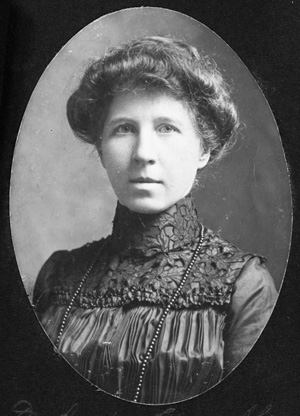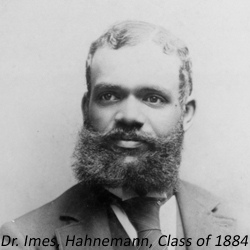Our Diverse History

Drexel University College of Medicine has a rich history of diversity as an institution of opportunity for those who would not have been candidates for medical school in their time, due to sexual orientation, ethnicity or cultural barriers. Our heritage as the Woman's Medical College of Pennsylvania, the first medical school in the world for women, and Hahnemann University, our homeopathic legacy institution which admitted non-mainstream students, grounded our institution in a legacy of diversity. We have been graduating an ethnically and racially diverse population of physicians and scientists since the 19th century.
Read more about the history of Drexel University College of Medicine
In 1848, the Homeopathic College of Pennsylvania was established by Constantine Hering, Jacob Jeanes, and Walter Williamson to provide training in what was then an emerging system of medicine called homeopathy. In 1869, the Homeopathic College was renamed in honor of Samuel Hahnemann, one of the pioneers of homeopathic medicine, as Hahnemann Medical College.
Visit the Doctor or Doctress? website. Explore American history through the stories of women physicians.
In 1850, the Female Medical College of Pennsylvania (1850-1867) was established by Quaker businessmen, clergy, and physicians. Headed by philanthropist William J. Mullen, the school became the world's first medical school for women. Later, this would become Woman's Medical College of Pennsylvania.
Our History and Black Lives Matter at The Legacy Center
We condemn the systemic racism resulting in racist violence against Black people and other people of color. As keepers of the historical record, we recognize the damage of white supremacist values, the myth of neutrality of archives and special collections, and our responsibility in revising and augmenting the record to amplify the voices of Black, indigenous and people of color, and other oppressed populations. We need to change the systemic professional and institutional practices that put Black memory and experiences at the extreme margins, while removing barriers for Black memory workers to work in the profession. To accomplish this, we will increase our efforts in at least three areas:
- We will support more thorough documentation of Black experiences, through institutional collecting and support of community archiving, to work ethically and non-exploitatively toward a more complete historical record.
- We will reveal evidence of racism against Black people throughout our collections and in the history of the school and communities it's served through the years up to the present.
- We will advocate within the profession widely, locally and institutionally to actively pursue practices, policies and programs that increase the representation of Black people in the profession.
Learn More

"Dr. Annie," as she was known, was initially educated by her physician father. She graduated from Woman's Med in 1884.
Alumni Stories
The Legacy Center's collections on women in medicine include a rich variety of resources on women's caregiving during the war. Although 56 women physicians served in the military, they were not commissioned officers as men were. Instead they worked as "contract surgeons," and only 11 of them served at the front. Pulse (Summer 2017)
At a time when most women could not vote or get a bank loan, Annie Lowrie Alexander, MD, an alumna of the Woman's Medical College of Pennsylvania, was a charter member — and became president — of the Mecklenburg County Medical Society. The first licensed female physician in North Carolina, Alexander opened her practice in Charlotte in 1887 and served the community for more than 40 years. Drexel University College of Medicine Alumni Magazine (Spring/Summer 2017)
The College of Medicine at Drexel is the successor institution to the world's first and longest-lasting medical school for women. The Woman's Medical College of Pennsylvania opened in 1850 and is estimated to have produced as many as a third of all American women physicians until 1968. Pulse (Winter 2016)
Eliza Grier (1897)
Eliza Grier, graduate of Woman's Medical College of Pennsylvania, class of 1897, was born into slavery. Eliza worked for a year picking cotton to pay for the next year's medical school, taking her seven years to graduate. After graduating, she went to North Carolina to practice.

Thomas Imes (1884)
Thomas Creigh Imes, was the first African American to graduate from Hahnemann, class of 1884. He served the Philadelphia community in his practice and also as a board member of Mercy Hospital in Philadelphia.
L. Rosa Minoka Hill (1899)
Dr. L. Rosa Minoka Hill, Woman's Medical College of Pennsylvania, class of 1899, was a Mohawk, raised by Quakers. She lived and worked on the Oneida Reservation in Wisconsin. In 1947 she received the Indian Achievement medal for personal achievement and humanitarian service to her people.
In Their Own Words
"Hahnemann had a place for us. We came to medicine as the first generation in our families. You have to remember that as a Jew, a Catholic, or any other minority back then, you didn't have much of a chance of getting into a medical school anywhere."
Herb, Hahnemann University, Class of 1956
"At Hahnemann, it didn't matter where you came from, you just had to be competent. We were taught that if you're smart enough and listen hard enough, the patient will tell you what is wrong."
Ana, Hahnemann University, Class of 1968
Back to Top